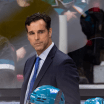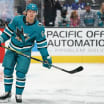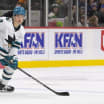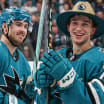The old cliché suggesting players head to the golf course once the season is over doesn't apply here. Saturday's ouster from the Stanley Cup playoffs means a different consequence for the San Jose Sharks. It's time to get back to work, especially for the younger players in the organization.
"Some of the guys on the Barracuda - the young players who are going to be very important for this team going forward - need to use this opportunity that they have by playing and pursuing the Calder Cup," Sharks general manager Doug Wilson said.
The constraints of the NHL's salary cap system places a greater importance on drafting and developing talent. The days of a spend-free economy are long gone. Teams that thrive from season to season find a way to replenish rosters with an influx of young talent.
And it's no different in San Jose.
Young Sharks Continue to Work in Offseason
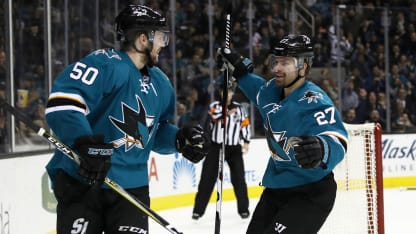
"This is why we brought the Barracuda out here," Wilson said of his top development team's relocation from Worcester, Mass., to the South Bay in the fall of 2015. "The infusion of young players is going to be crucial. We added 34-35 players the last couple of years. They all have offensive creativity and speed, but they're three-zone players, too, so they can be trusted by our coaching staff."
Some of that talent is on display now as the Barracuda, champions of the Pacific Division, are locked in a 1-1 tie with the Stockton Heat in a best-of-five first-round series. Management's eyes are squarely fixed on how the postseason unfolds with particular interest in a number of players who have NHL aspirations.
"As a West Coast team you're going to need 30 players," Wilson said. "The younger players coming in and giving you different looks on different nights and different depth. I think that is important and that's where we're position to be built for a long time."
The continued maturity and development of young forwards Melker Karlsson, Chris Tierney and Joonas Donskoi, along with the emergence of rookies Timo Meier, Marcus Sorensen and Kevin Labanc, resulted in the departure of Matt Nieto and Tommy Wingels in addition to giving San Jose better depth up front than last season.
"The competition of young guys sometimes pushing for jobs, and sometimes pushing people out, that's a healthy thing," Wilson said.
In addition to the aforementioned, Barracuda forwards Ryan Carpenter, Danny O'Regan and Barclay Goodrow received brief looks with the Sharks in addition to defensemen Mirco Mueller, Joakim Ryan and Tim Heed. Some got an opportunity to dress, others were promoted and had the chance to practice and watch from high above.
"If you talk to Roy Sommer there's probably 7-8 guys on that team that he feels can step in and play," Wilson said. "Competition is good."
Sharks coach Peter DeBoer welcomes the possible influx of young talent from the AHL. He's also aware it doesn't happen over night, and players have to continue to meet new challenges when they're in training camp and facing NHL caliber competition.
"Because they're young doesn't mean they're ready to be productive, full-time NHL players, or because they played well for a month or a year that doesn't mean that it's a career yet," DeBoer said. "We've got a lot of guys who have a lot of potential, but they need to have big summers and take a step and not be just one-season or one-month players."
DeBoer and Wilson see the same trend in today's NHL. Teams with a legitimate shot at winning a Stanley Cup are a equal blend of young, mid-age and older veterans working together under a defense-first system that leads to quick transition with an emphasis on creating and finishing scoring chances in addition to quality special teams.
Adding new pieces to the San Jose puzzle in the fall is critical to a team that wants to extend a streak of reaching the playoffs in 12 of 13 seasons and 19 times in 26 tries overall.
"They've got to showcase what they've got now in the playoffs, then come in September and take a job," Wilson said. "We plan on a lot of the younger players competing and if they are ready, they will play."

